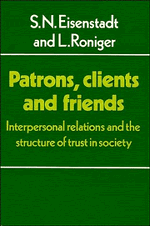Book contents
- Frontmatter
- Contents
- Preface
- 1 PERSONAL RELATIONS, TRUST AND AMBIVALENCE IN RELATION TO THE INSTITUTIONAL ORDER
- 2 THE CONSTRUCTION OF TRUST IN THE SOCIAL ORDER AND ITS AMBIVALENCES: VIEWED FROM THE DEVELOPMENT OF SOCIOLOGICAL THEORY
- 3 THE STRUCTURING OF TRUST IN SOCIETY: UNCONDITIONALITIES, GENERALISED EXCHANGE AND THE DEVELOPMENT OF INTERPERSONAL RELATIONS
- 4 THE BASIC CHARACTERISTICS AND VARIETY OF PATRON–CLIENT RELATIONS
- 5 THE CLIENTELISTIC MODE OF GENERALISED EXCHANGE AND PATRON–CLIENT RELATIONS AS ADDENDA TO THE CENTRAL INSTITUTIONAL NEXUS
- 6 THE SOCIAL CONDITIONS GENERATING PATRON–CLIENT RELATIONS
- 7 VARIATIONS IN PATRON–CLIENT RELATIONS
- 8 RITUALISED INTERPERSONAL RELATIONS; PRIVACY AND FRIENDSHIP
- 9 CONCLUDING REMARKS: THE DIALECTICS OF TRUST AND THE SOCIAL ORDER
- Notes
- Index
6 - THE SOCIAL CONDITIONS GENERATING PATRON–CLIENT RELATIONS
Published online by Cambridge University Press: 01 June 2011
- Frontmatter
- Contents
- Preface
- 1 PERSONAL RELATIONS, TRUST AND AMBIVALENCE IN RELATION TO THE INSTITUTIONAL ORDER
- 2 THE CONSTRUCTION OF TRUST IN THE SOCIAL ORDER AND ITS AMBIVALENCES: VIEWED FROM THE DEVELOPMENT OF SOCIOLOGICAL THEORY
- 3 THE STRUCTURING OF TRUST IN SOCIETY: UNCONDITIONALITIES, GENERALISED EXCHANGE AND THE DEVELOPMENT OF INTERPERSONAL RELATIONS
- 4 THE BASIC CHARACTERISTICS AND VARIETY OF PATRON–CLIENT RELATIONS
- 5 THE CLIENTELISTIC MODE OF GENERALISED EXCHANGE AND PATRON–CLIENT RELATIONS AS ADDENDA TO THE CENTRAL INSTITUTIONAL NEXUS
- 6 THE SOCIAL CONDITIONS GENERATING PATRON–CLIENT RELATIONS
- 7 VARIATIONS IN PATRON–CLIENT RELATIONS
- 8 RITUALISED INTERPERSONAL RELATIONS; PRIVACY AND FRIENDSHIP
- 9 CONCLUDING REMARKS: THE DIALECTICS OF TRUST AND THE SOCIAL ORDER
- Notes
- Index
Summary
In the preceding chapter we have analysed the basic characteristics of the clientelistic mode of structuring generalised exchange in society and have distinguished it from the forms of patron–client relations which develop as institutional addenda to other modes of generalised exchange. Each of these modes entails a specific way of structuring trust in society, and hence tends to generate a tendency to crystallisation of the formal and informal interpersonal relations in specific manners, as is the case with the patron–client relations we have already analysed.
We have also indicated there that the clientelistic mode of generalised exchange organises in specific ways the major dimensions of the institutional order which are most important from the point of view of the possibility of breakdown of extension of trust. From this perspective, the clientelistic mode of generalised exchange was characterised by a distinction between the criteria which regulate different institutional spheres, together with the relative blurring of the clarity of these principles; by a relative gap between the levels of structural and of symbolic differentiation of the major institutional spheres, and by a far-reaching de facto limitation in the access of broader strata to the centres of power.
In order to understand better these characteristics of the institutional order and the nature of the structuring of trust which is inherent in the clientelistic mode of generalised exchange, it is necessary to study the conditions which give rise to it, or are related to its development and continuity.
- Type
- Chapter
- Information
- Patrons, Clients and FriendsInterpersonal Relations and the Structure of Trust in Society, pp. 203 - 219Publisher: Cambridge University PressPrint publication year: 1984



